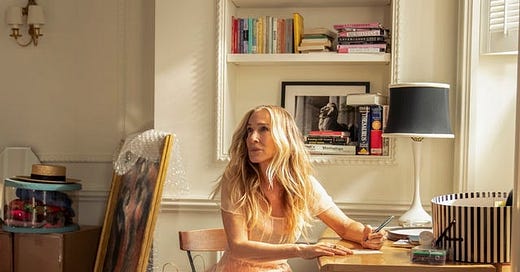How does being a freelance writer actually work?
My scattergun way (the only way?) of making a creative living.
Things have been busy lately. If you’ve been watching And Just Like That, you’ll know exactly what freelance-writer life is like. You pop on some haute couture; you tap out a sentence or two; you stare wistfully into the middle distance; you take a week off. It’s exhausting! Carrie Bradshaw can’t even summon the energy to name her protagonist.
Actually, I did think people might like to know more about how it really works to be a freelance writer in 2025 – since sometimes I hear from those who are thinking of taking the plunge. It’s hard to know what to advise them, because I both love it, and also feel this way about it:
Perhaps I’d be earning more money as a writer if I could explain that without the emoji.
I do lots of different things in order to make a living. If the following list sounds like a long brag about how productive and in demand I am, then please be aware that lots of this work is sporadic, some of it is only paid in a token way, and some months are veeeeeeery quiet.
I write features for newspapers and magazines – there’s less of this around than there used to be, but I still absolutely love it.
I take editing and commissioning shifts on newspapers and magazines (usually covering somebody’s holiday).
I write this Substack, and sometimes for paying subscribers I organise live interviews and writing events.
I wrote a great book!!
I teach workshops on various aspects of writing and interviewing (for example this one coming up at the Edinburgh Book Festival in August). Last week I also went into Amazon’s London office to speak to a team about writing (give me a shout if you want something similar at your workplace).
I interview authors at festivals and bookshops.
I get interviewed as an author at festivals and bookshops. (I am doing two of these events at the Edinburgh Book Festival – one on reading and creativity alongside Daisy Buchanan, and another on the writer and the page alongside Roland Allen).
I make a podcast.
I copy-edit and proofread books for a small publisher, and I’m doing some PR for their latest beautiful architecture book.
I’m working with another writer on a possible project – KEEP EVERYTHING CROSSED (but also don’t start holding your breath yet).
I sometimes think I should be running a writers’ support group or offering therapy to writers in despair, but I haven’t quite worked that one out yet – if you want to book me to chat to your group, you know where I am. Also if you need me to put a shelf up, babysit your kids or pick up your dry-cleaning, I’d consider it.
Do they still call this a portfolio career? I think it’s very typical now for people in creative industries. There’s something very nice about it – I like variety, and it allows me to incorporate lots of things that I enjoy but wouldn’t necessarily find in one job, including writing, editing, interviewing, meeting new people, working alone and working as part of a team.
Still, if I could pay my bills and enjoy a life in London with only two or three of these things, or even by concentrating on one at a time, that would be fantastic.
Keeping many pots in the air/balls on the boil requires you to be very organised, which sometimes feels like an extra, unpaid job. I never miss deadlines but I do forget to reply to emails (very sorry). I also sometimes worry that doing a little bit of this and a little bit of that makes it harder for me to give very deep thought to either this or that. There were periods in 2023 when I just wrote my book, day after day, and I have such fond memories of being totally engrossed in that.
A recent newsletter from the always excellent
cheered me up. He’s writing what sounds like a great book about how people through the ages have funded their creative work, and he writes, ‘if there’s one trait that extends across nearly all of my subjects, it’s a kind of practical impracticality: a consistent refusal to do the pragmatic, socially acceptable, or fiscally responsible thing when doing so conflicts with one’s deepest creative impulses.’ This made me feel better about not having thrown in the writing towel to do something more stable.Currey also quotes the brilliant Brian Eno advising art students to ‘try not to get a job’, although Eno adds that without a universal basic income, that’s hard advice to follow. The whole newsletter is great – read it here:
Anyway, I’d better go because I’ve now got 45 minutes of gazing wistfully into the middle distance to complete.
How’s your writing going? Do leave a comment – I’d love to discuss.
Good luck with your writing this week!
Keep reading with a 7-day free trial
Subscribe to In Writing with Hattie Crisell to keep reading this post and get 7 days of free access to the full post archives.






